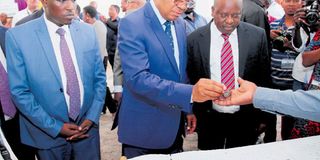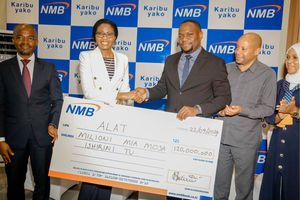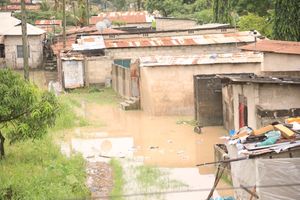Harmonise mining laws, African countries urged

Prime Minister Kassim Majaliwa is shown minerals when his visited one of the booths at the 2020 International Mineral and Mining Investment Conference in Dar es Salaam yesterday. Looking on are Minerals minister Doto Biteko (left) and National Assembly speaker Job Ndugai. PHOTO | PMO
Dar es Salaam. Africa needs common laws and regulations to govern mining as a way of preventing the continent from losing investors on the grounds of unfavourable business environments, analysts said yesterday.
They were speaking during the 2020 International Mineral and Mining Investment Conference that brought together the sector’s players - from within and outside the country - to discuss challenges and opportunities.
Kenyan law professor PLO Lumumba told participants that Africa needed laws and regulations that would prevent investors from regarding certain nations on the continent as having investment conditions that were more lenient that those in other countries.
“Africa should have the common perspective in negotiation with foreign investors in the mining sector,” noted Prof Lumumba, who once served as the director of the anti-corruption commission in Kenya.
“When Acacia Mining was asked to pay the tax by the Tanzanian government, some members of the international community had it that Tanzania was now creating an environment that is hostile to investors.
“But there is still truth that there is no gain without pain. History has demonstrated that not once or twice.”
He commended President Magufuli for taking bold decisions in the sector, but opined that Tanzania should not walk alone, but rather engage the region and move collectively.
“If investors run from Tanzania they shouldn’t find a different ecosystem in Kenya, Uganda, Rwanda and DRC Congo. The oxygen they breathe must be the same,” he pointed out.
According to him, the East African Legislative Assembly should be entrusted with coming up with a regional protocol that defines the trading bloc’s investment rules for the mining sector.
Prof Lumumba suggested that the benefit out of the mining sector should be felt by people and not just end up to be told that its contribution to GDP has gone up.
“Nobody eats GDP,” Prof Lumumba said, adding, “GDP and per capita income mean nothing if you have no money in your pocket.”
Ugandan State Minister of Mineral Development, Ms Sarah Achieng Opendi, seemed to read from the same script.
“Let’s have uniform strong policies, laws and regulations to regulate the sector,” she said.
She was of the view that strong teams should be there to reinforce regulations.
Ms Opendi warned that without strong laws there could be exploitation, meaning less benefits for the people and government.
The Permanent Secretary in the Ministry of Natural Resources and Tourism, Prof Adolf Mkenda, said African countries should borrow a leaf from Tanzania when it came to boldness in contracts negotiation.
“It is not easy to be firm when negotiating with multinational companies from rich countries than yours, but our President has dared and succeeded,” he said.
Noting that, it was easy for a rich country to corrupt a poor one when it came to negotiations, he said, that was the kind of disease Africa needed to fight.
“Let us the entire Africa ensure that we get our due rights out of negation,” advised Prof Mkenda.
The speaker of the National Assembly, Mr Job Ndugai, said the amendment of mining laws in 2017, which now empower the government to own not less than 16 per cent of mining concerns, was a bold decision.
Prime Minister Kassim Majaliwa pledged that the government will continue to improve the business environments in the mining sector for it to have a meaningful contribution to GDP.
“We have what it takes to increase the contribution from the current 5.1 percent to 10 percent in 2025,” he said.
Minerals minister Doto Biteko reiterated that some measures that the government has taken to improve business environments in the sector include removal of 18 percent value added tax (VAT) and a five-percent withholding tax imposed on minerals. He added that 28 regional mineral markets and 25 buying centres have so far been established.




